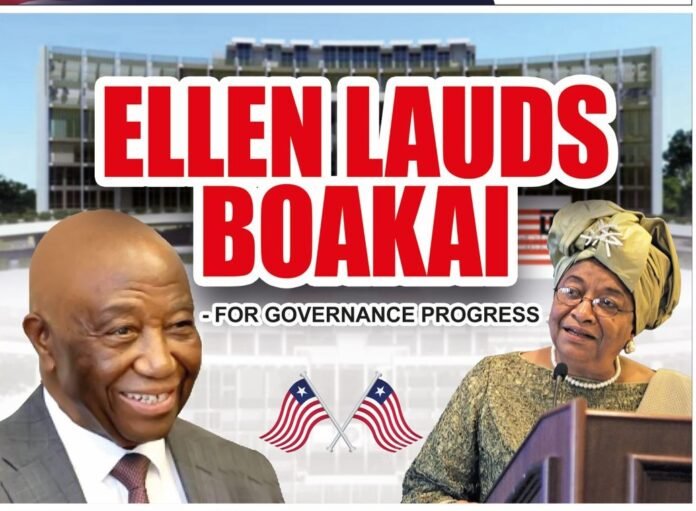MONROVIA – Former President Ellen Jonson-Sirleaf has praised President Joseph Nyuma Boakai, for what the ex-Liberian leader attributed to progress in the country’s governance process under his nearly two-year reign.
President Boakai inherited a country already plagued by severe economic issues and grappling with chronic corruption, after being elected president of the nation in 2023.
Boakai succeeded George Weah, a former soccer star whose presidency was criticized for failing to fulfill key campaign promises, stoking public frustration that contributed to shaping the political landscape Boakai took over.
His presidency marks a return to power for the Unity Party, during whose administration he served as vice president for 12 years under Africa’s first elected female head of state, Ellen Johnson-Sirleaf, from 2006 until 2018.
However, Boakai has promised to reunite the country and “rescue” it from economic woes.
Sirleaf acknowledged the shortcomings of previous administrations of the Government of Liberia, including hers, and commended President Boakai’s administration for the gains being made currently on his watch.
She confessed that her administration was faced with hurdles and shortcomings, which implied that there were areas where further progress could have been made when she steered the State’s affairs, for 12 years.
Sirleaf made these assertions recently when she appeared as guest on the radio show “Changing Minds and Changing Attitudes,” simulcast on state radio (ELBC) and the Liberia National Television (LNTV), where she showered praises on the administration of President Boakai for achieving what she describes as visible progress in key areas like electricity water supply, airport administration and services.
With limited capacity and resources, the ex-president maintained that the current administration of the Government of Liberia is doing well, stating, “They are doing a very good job.”
She particularly mentioned upgrades at the country’s lone international airport, the Roberts International Airport and infrastructure developments, including roads and the refurbishment of the Redemption Hospital as well.
“I saw some improvements at the RIA, and I was very pleased with the lightings and everything,” Sirleaf pointed out, indicating that coincidentally, many of the things being achieved under the current regime were started by her administration, with many not being continued by the administration that preceded the Boakai’s administration.
She called such achievements promising signs of national progress, and she implored the leaders of today and future leaders to learn lessons from past experiences.
She emphasized that sustained commitment to reform and development is paramount to Liberia’s future stability and growth.
President Boakai and former President Sirleaf have a salient political history in Liberia, marked by sustained collaboration that began in their joint 2005 presidential campaign.
Boakai served as Sirleaf’s Vice President between 2006 and 2018, a 12-year span that he used effectively to help Liberia rebuild and develop after the civil war, including holding responsibility for agricultural decentralization and Liberian Senate President.
The partnership between the two was reinforced in the 2011 election, where Boakai again was selected by Sirleaf as her running mate to advance their shared development agenda.
Boakai’s deep experience under Sirleaf’s administration, described as being “a heartbeat away from the presidency,” became a cornerstone of his political identity and later fueled his own presidential bid.
Boakai was selected as Sirleaf’s running mate in the 2005 election, a strategic move to strengthen their campaign in vote-rich Lofa County.
As Vice President, Boakai was instrumental in national reconstruction, peace-building, and economic development, particularly in agriculture and rural empowerment.
He was re-nominated as Sirleaf’s vice-presidential candidate in 2010, reinforcing her faith in him even with the political challenges at the time.
After Sirleaf’s two terms, Boakai ran for the presidency in 2017 and lost to George Weah in a run-off, a loss which many of his supporters attributed to electoral fraud and vote-rigging.
Despite this loss, he went on to unseat Weah when he won the country’s presidential election in 2023.
No doubt, Boakai’s legacy remains closely tied to Sirleaf’s administration, with analysts noting his role as a loyal lieutenant and a key figure in Liberia’s transition from conflict to stability.

